#Mr. Smith Goes to Washington
Photo
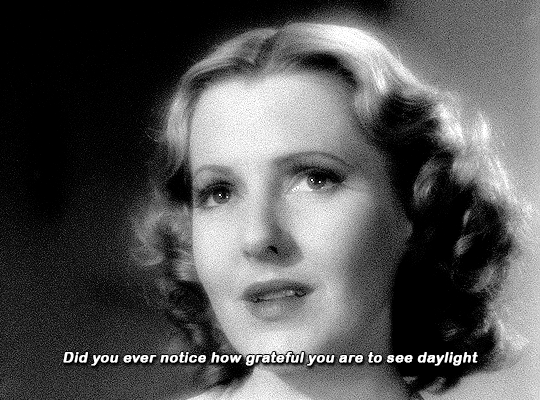
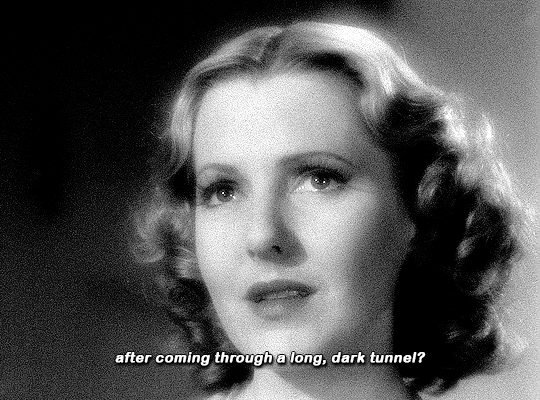
Mr. Smith Goes to Washington
1939, directed by Frank Capra
#mr. smith goes to washington#jean arthur#oldhollywoodedit#classicfilmedit#1930s#gif#creations#jonah#userteri#uservita#userdeforest#uservini#classicfilmsource#filmgifs
2K notes
·
View notes
Text
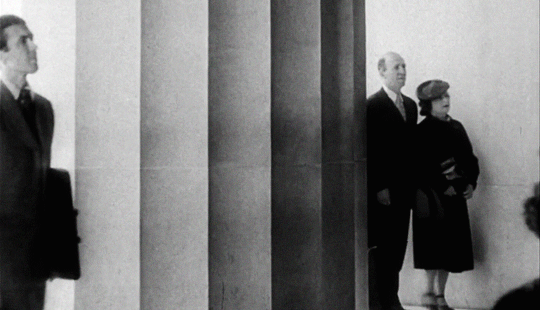

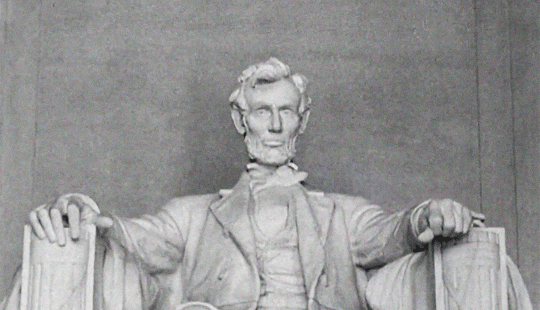
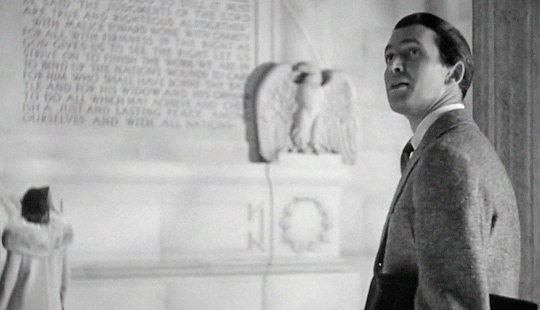
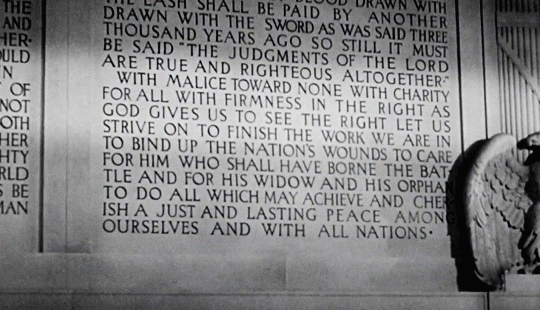
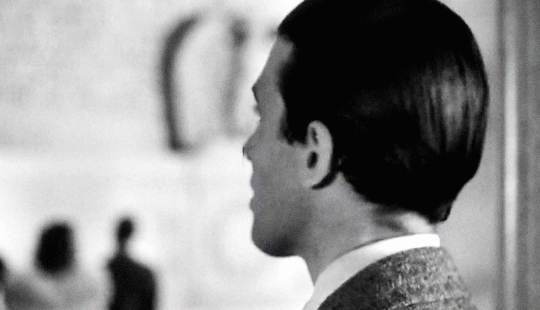
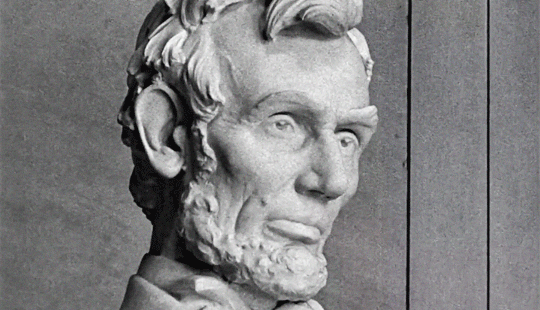
And Mr. Lincoln, there he is! He’s just looking right straight at you as you come up those steps, just…just sitting there like he was waiting for somebody to come along.
MR. SMITH GOES TO WASHINGTON (1939) dir. Frank Capra
#happy birthday father abraham#me too jimmy ♥#he's just like me fr#filmedit#film#old hollywood#mr. smith goes to washington#james stewart#jimmy stewart#classic film#abraham lincoln#anyway this scene made me cry#what else is new#o captain my captain
45 notes
·
View notes
Text

#movies#polls#mr. smith goes to washington#mr smith goes to washington#frank capra#30s movies#old hollywood#james stewart#jean arthur#have you seen this movie poll
65 notes
·
View notes
Text
jimmy stewart really knew how to play just a sad little guy beat down by society
#james stewart#jimmy stewart#it’s a wonderful life#mr. smith goes to washington#made for each other#rear window#the philadelphia story
85 notes
·
View notes
Text
If I had a nickel for every time I've watched a Frank Capra movie where Jimmy Stewart plays an idealistic everyman whose friends sing "Auld Lang Syne" during a moment of triumph for him, I'd have two nickels, which isn't a lot, but it's weird that it's happened twice.
#mr. smith goes to washington#it's a wonderful life#frank capra#we're not getting to the meta part of things yet#but i just had to mention that#i did specify 'that i watched' to cover the fact that i have not yet seen all capra movies#and it's possible this may occur elsewhere in his work
73 notes
·
View notes
Text
Mr. Smith Goes to Washington: Genre and Themes
At first glance, indeed, even at second glance, Mr. Smith Goes to Washington doesn’t seem to really lend itself to a specific genre the way The Goonies or The Princess Bride did. Whereas those films positively dripped with the atmosphere of an adventure or fantasy film, Mr. Smith Goes to Washington is considerably more ‘real world’ than that, without necessarily heading into ‘slice of life’ territory.
If story is the backbone of a film, the underlying solid base, then genre is the trappings, the flavor, the seasonings the writers get to play with to create their final dish. Some stories automatically come with pre-packaged genre, as it would seem, stories like Frankenstein seem little suited to be anything other than a sci-fi horror film, after all, but most, and indeed some would say all stories have the capabilities of remaining solid in their identities, even with a completely different genre than we’re used to.
In the case of Mr. Smith Goes to Washington, however, there doesn’t seem like there’s a lot of ingredients to mix.

Officially, Mr. Smith Goes to Washington is labeled as a ‘political comedy-drama’, an eclectic mishmash of styles that doesn’t necessarily rear its head too often in the realm of film. Political films tend to be more true stories like All the President’s Men, or thrillers like The Manchurian Candidate. Mr. Smith Goes to Washington is neither. However, that isn’t to say it’s not political.
The entire world of Mr. Smith Goes to Washington is politics. It lives and breathes the inner workings of American bureaucracy, without either exploiting or sugarcoating it.
It is, at its core, an anti-politics political film. There is no pleasure that the film derives from exposing any corruption, nor does it take pains to pretend that corruption does not exist. It freely paints the politicians and the non-politicians as people, dealing with consequences to their actions: from Senator Paine, the tarnished hero, to Clarissa Saunders, the cynical, worn-out tool of Washington. The focus of the story is not so much on the inner workings of the state and country as it is the people that perform them, that manipulate the cogs of the machine to their own benefit, and those who stand to prevent it.
It’s not a very technical film. You don’t have to have a degree in law in order to understand the film, or allow it to resonate, and that, perhaps, is what makes it so special.
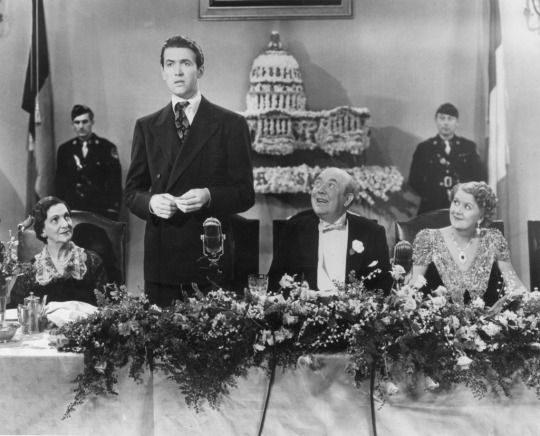
The ‘political’ slant of Mr. Smith Goes to Washington isn’t in the process that Saunders outlines to Jefferson in order to get his bill passed. On the contrary, the bill itself is a minor incident, the catalyst that forces the corruption out into the open. The story isn’t about the bill at all, nor is it even about the plot of the other politicians: it is about the politicians themselves. There are no parties mentioned, no real figures portrayed, no accurate historical events referenced: and yet something about this film did strike a chord in the very real Washington D.C.
Upon Mr. Smith’s release in Constitution Hall, DC dissolved into uproar about the film’s portrayal of American politics, to the point that Alben W. Barkley, the Senate Majority Leader at the time, remarked that it: “makes the Senate look like a bunch of crooks”.
In other words, something about this film struck some people, mostly the people in Washington, the wrong way. And yet, even at the time of its initial release, audiences, the Mr. Smiths of the USA, adored it for a reason.
At its core, chiefly, yes, Mr. Smith is a film about politics, and even history. Every fiber of the movie vibrates with patriotism, with love for America, and with pride in democracy. The film is not a condemnation as such as it is a warning: ‘we will lose what we have built if we think only of ourselves.’ It is a perfect combination of both a celebration of America’s past, and a concern for the future, a notation of the path the nation’s leaders seemed to be going down. Mr. Smith Goes to Washington is a story about big P Politics, all right, but it is not a scowling, scolding film, pointing an accusatory finger at the little p politicians, the fallen white knights. It is instead a film that holds up a figure of a person who knows on what the country was founded, and believes in it so strongly enough that he forces a change, even if it’s a small one.
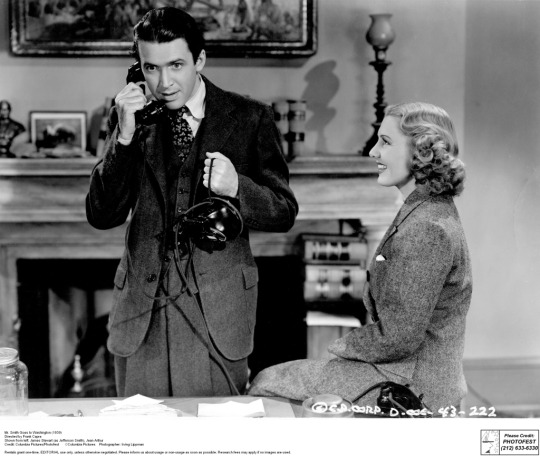
And the film is also pretty funny, too.
The genre of ‘comedy’ tends to bring to mind slapstick or wordplay classics, and in the 1930s, the ‘comedians’ definitely had their specific brands: the Marx Brothers, the Three Stooges, Laurel and Hardy, and others were taking cinema by storm. Audiences, especially in the middle of the Great Depression, desperately wanted a laugh, and even though there were no pratfalls in Mr. Smith Goes to Washington, there is a wry sense of humor about it, particularly near the beginning.
Early scenes in this film play almost like scenes from a ‘fish out of water’ comedy, with Jefferson Smith having no idea how to function in the new, fast-moving, cynical climate of Washington D.C. Other characters, such as Saunders and Diz, exist as quip-generating machines, full of the fast-paced, witty dialogue characteristic of films of the time. Many of the more comedic sequences in the story come about through direct conversation between Saunders and Smith and the subsequent clash of ideas and personalities.
So yeah, Mr. Smith is a pretty funny movie at times. I must admit though, it’s hard to make the argument that it’s a comedy.
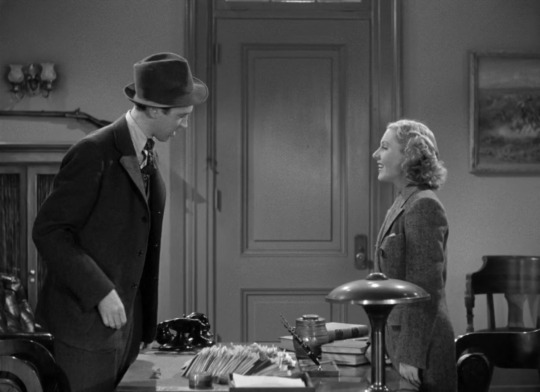
Smith’s plight is not comedic, at least, not more than halfway through the story. He is not a comedic figure, nor are most of the characters around him. While one could make the argument that the initial conceit of the story is comedic, I am hard pressed to agree that the story remains a comedy throughout. If anything, the throughline of tragedy seems clearer, notably in the character of Senator Paine.
Paine is what Smith could have been: a noble figure broken by greed, by corruption, by fear, turned into another cog in someone else’s profit machine, willing to throw countless people under the bus for gain. By the end of the story, he is not only guilty, he is convicted, ashamed after being forced to confront what he has become. His story nearly ends in suicide, and it certainly ends in the ruination of his career, after having thrown away belief in all of the words he is so used to spouting. He is the warning thrust up before contemporary Washington’s eyes: the white knight tarnished by greed.
Smith’s story, though uncorrupted, is similarly bleak: unbelieved, unheard, and unable to get the word out, he ends the film exhausted and crushed after hours of seeming futility. The film’s happy ending does not come as a result of all of his hard work, but through the guilt of Senator Paine driving him to confess. Smith does not reach the climax of the film like a comedy protagonist does at all, but like a tragic hero.
And yet, this film isn’t a tragedy either.
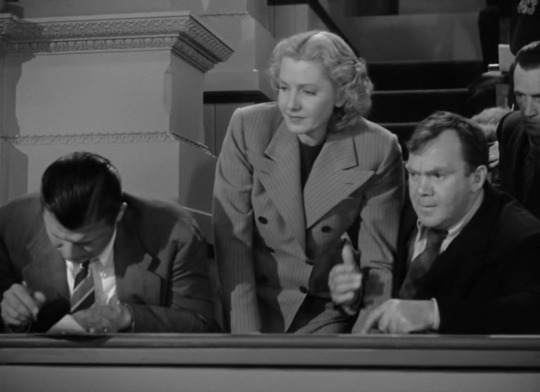
So what is it?
I have a theory: that a film’s genre can be best solidified through a few major checkpoints: its themes, and its characters, specifically its protagonist.
The themes of Mr. Smith are obvious ones: duty to one’s country, certainly, but honesty above all. The liars are the villains, and the heroes tell the truth. The story is built around good morals and simplicity, with the center of virtue being Mr. Smith himself.
In another era, Smith himself may have been a knight in shining armor, risen to his position from peasantry to achieve noble deeds. As it is, in 1930s America, Smith is an ordinary man in an extraordinary position: an everyday guy elevated to the position of senator.
Of course, the intention was never to give him any real power, but nonetheless, power he wields. And it’s his decisions on handling that power that set him apart from the other characters. He behaves very much like a normal person, an average citizen in a political jungle with very little navigation. There is no hero’s journey here: if anything, Mr. Smith finishes the story as a broken, more cynical character rather than a triumphant hero. The victory is in refusing to compromise your principles, no matter the cost or circumstance, and there is no dragon to slay here: just men, corrupted by power.
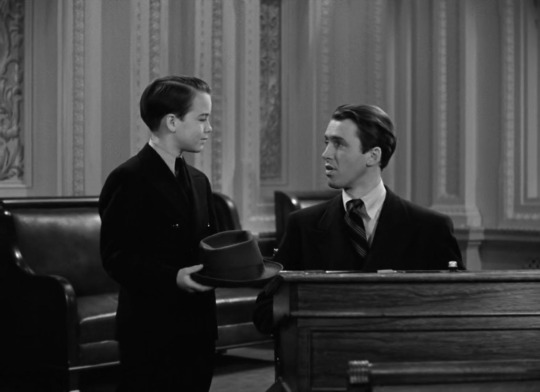
In other words, it’s a drama.
While there are many forms of ‘drama’ in the broad spectrum, typically, the term ‘drama’ means that a subject is more dramatic than humorous, with a primary element of the story being conflict, but not necessarily of the physical kind. It’s a story with more of an emphasis on who the story is happening to, and why, with less concern for what exactly is happening.
Such is the case for Mr. Smith Goes to Washington.
Mr. Smith is a story about real people, people you or I might know, from the virtuous Jefferson Smith to the cynical Ms. Saunders, to the corrupt, but still human, politicians, some malicious, some merely led astray from their previous values. This is not a story of ‘heroes vs. villains’, this is a story about the ‘Right Thing to Do’, and the people with the courage to do it.
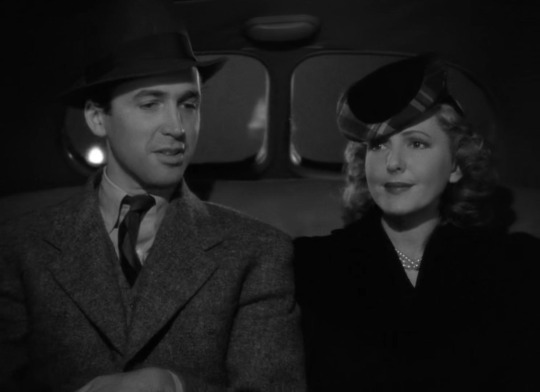
And that’s most of its appeal.
Capra’s passion is for people in this film, the everyday, the ordinary, the ‘Little Guy’ who becomes, not a dragonslayer, but a man with the opportunity to truly do some good, faced with tough decisions. It’s a story full of heart, sprinkled with humor, and loaded with humanity as it views, through very human lenses, the world of politics through a protagonist who’s meant to be a fish out of water.
That is Mr. Smith’s legacy.
The story isn’t groundbreaking. The cinematography isn’t breathtaking. The writing isn’t jaw-dropping. But the people, the characters, live and breathe on the screen as people, characters that the audiences love, and cheer for. We root for these people because of the drama of the situation, and the time and care that the film takes to delve into them.
That, more than the politics of the situation, is the reason people return to this film again and again.
And that, the people, the characters, is what we’ll be turning our attention to next time.
#Mr. Smith Goes to Washington#Mr. Smith Goes To Washington 1939#1939#30s#Film#Movies#Political#Drama#Comedy#James Stewart#Jean Arthur#Claude Rains#Edward Arnold#Thomas Mitchell#Frank Capra
25 notes
·
View notes
Text
This edit is the only thing on my mind <3
50 notes
·
View notes
Text


mr. smith goes to washington (1939)
#mr. smith goes to washington#msgtw#this is my favorite part of the movie im sad no one's giffed it so here
5 notes
·
View notes
Text
Mr. Smith Goes to Haiti
A remake of Mr. Smith Goes to Washington, in which an idealistic young US Senator makes a trip to post-occupation Haiti. It's not nearly as funny as the original film.
#bad idea#movie pitch#pitch and moan#history#us government#mr. smith goes to washington#frank capra#jimmy stewart#us imperialism#diplomacy#senator#us senator#haiti#haitian history#imperialism
2 notes
·
View notes
Text
Welp I guess it’s time to watch Jimmy Stewart be adorable…
#old hollywood#black and white#golden age of hollywood#james stewart#jimmy stewart#it’s a wonderful life#mr. smith goes to washington#tinuvielsthoughts
6 notes
·
View notes
Photo

25 notes
·
View notes
Text
Day 27
August 27
Liberty's too precious a thing to be buried in books, Miss Saunders. Men should hold it up in front of them every single day of their lives and say, 'I'm free to think and to speak. My ancestors couldn't, I can, and my children will.
-Jefferson Smith
(Played by Jimmy Stewart)
-Mr. Smith Goes to Washington
2 notes
·
View notes
Text
Mr. Smith Goes to Washington (1939)

Only one thing dates Mr. Smith Goes to Washington: the controversy that accompanied its release. Said controversy seems absurdly comical when looked at today. This 1939 film is eerily modern. Brilliantly acted and directed, memorable, emotional, funny and touching, it’s the kind of movie you’ve seen referenced and imitated many times - you just don't know it. This is one of the great ones, the kind of story that awakens something inside you.
Under pressure from the corrupt Jim Taylor (Edward Arnold), Governor Hubert Hopper (Guy Kibbee) must appoint a new U.S. senator to replace the recently deceased Sam Foley. They are looking for a stooge the crooked Senator Joseph Paine (Claude Rains) can keep in check. Taylor chooses Jefferson Smith (James Stewart), a wholesome idealist with no political experience.
If you’re familiar with any moment from Mr. Smith Goes to Washington, it’s probably the climactic “filibuster scene”. If this is all you know, you have no idea what the film is really like. You might’ve guessed that it’s inspirational but Smith is more than an everyman, he’s the concept taken to another level. Once in Washington, he immediately walks away from his entourage and goes on a pilgrimage around the city, visiting monuments that take his breath away. As an audience member in the 21st century, you chuckle a little but it doesn’t take too long for you to understand what he’s seeing. Smith is not like us. He’s never seen the Statue of Abraham Lincoln; he’s only heard and read about it. Standing in the shadow of the marble titan, he cannot help but be overwhelmed by hope and inspiration. He knows he’s underqualified for the job given to him. Rather than be discouraged, he's determined to try even harder.
You sympathize and fall in love with the dreamer thanks to James Stewart’s performance. When he comes head-to-head with Taylor and his stooges, you realize the movie is about so much more than politics; it’s about standing up for what’s right no matter the odds. Taylor has all of the power. He can basically do whatever he wants unopposed. Even knowing this cannot prepare you for the overwhelming obstacles Smith faces. And what does our hero have to counterattack with? Little more than the backing of the people he’s won over legitimately - which is still not much compared to what money can buy. It’s a nerve-wracking battle, the kind that makes you sink into a pit of despair. You don’t know whether ultimately, this is a fight he can win. Maybe an unhappy ending is the reason the film was attacked as anti-American and pro-Communist for its portrayal of corruption in the government...
Democrat and Senate Majority Leader Alben W. Barkley called the film “silly and stupid”, “a grotesque distortion” of the Senate, which is a shock to anyone who watches today. Part of what makes Mr. Smith Goes to Washington so good is its authenticity. Though Smith is an idealist, the story knows being in power doesn't mean you're a good person. There are a lot of crooked people in the story. Even the nice ones are passively complicit in the dark deals happening in Washington - but there’s also hope. It’s made clear that ultimately, Frank Capra believes one person CAN make a difference, that individuals ARE important.
All this makes the movie seem so dark and dire. It is, particularly during the last act but it’s also got a lot of humour throughout. Smith is such a fish out of water you can’t help but laugh at him when he arrives on the scene. You'll be in stitches every time he interacts with his appointed secretary, the cynical takes-no-guff-from-anyone Saunders (Jean Arthur, fantastic). The two of them are so good together that you could forget all of the business in the Senate and still have a great film.
Simply as a piece of cinema, Mr. Smith Goes to Washington is a delight. A particular scene in which the camera focuses on Smith’s hat says so much with so little. You don’t see the performers’ faces at all but you know exactly what’s going on. There are many scenes like this. It’s simply fabulous, the kind of movie that has a little bit of everything: romance, humor, suspense, great performances, camerawork and writing. This is the kind of movie you see once and then never forget. (On Blu-ray, June 26, 2020)

#Mr. Smith Goes to Washington#movies#films#movie reviews#film reviews#Frank Capra#Sidney Buchman#Myles Connolly#Jean Arthur#James Stewart#Claude Rains#Edward Arnold#guy kibbe#thomas mitchell#Beulah Bondi#1939 movies#1939 films
5 notes
·
View notes
Note
Top 3 movies that you would recommend everyone watch ASAP. Go 🥸
#randomasks
Oohh that's a good one! I have so many!
Pride and Prejudice, 2005
It's a Wonderful Life, 1946
Mr. Smith Goes to Washington, 1939
Honorable Mentions
Bringing up Baby, 1938
A Philadelphia Story, 1940
Roman Holiday, 1950
Breakfast at Tiffany's, 1961
Can you tell I love classic movies? Jimmy Stewart? Katherine Hepburn? Audrey Hepburn?
I also love Eleanor Powell movies. She's probably the best female dancer in Hollywood history.
#answered#classic films#classicfilmsource#classicfilmblr#pride & prejudice#mr. smith goes to washington#its a wonderful life#bringing up baby#a Philadelphia Story#roman holiday#breakfast at tiffany's#period drama#jimmy stewart#katherine hepburn#audrey hepburn#films#eleanor powell#silver screen
31 notes
·
View notes
Text
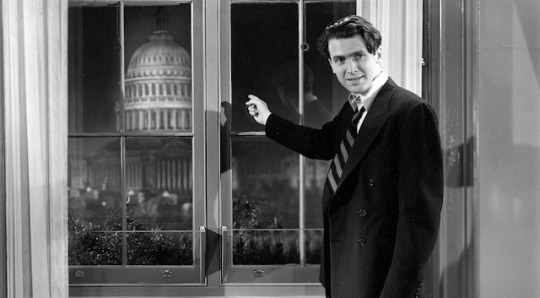
James Stewart in Mr. Smith Goes to Washington (Frank Capra, 1939)
Cast: James Stewart, Jean Arthur, Claude Rains, Edward Arnold, Guy Kibbee, Thomas Mitchell, Eugene Pallette, Beulah Bondi, H.B. Warner, Harry Carey, Astrid Allwyn, Ruth Donnelly, Grant Mitchell, Porter Hall, H.V. Kaltenborn, Charles Lane, William Demarest, Jack Carson. Screenplay: Sidney Buchman, based on a story by Lewis R. Foster. Cinematography: Joseph Walker. Art direction: Lionel Banks. Film editing: Al Clark, Gene Havlick. Music: Dimitri Tiomkin.
Perhaps only James Stewart (or Gary Cooper, who turned down the role of Jefferson Smith) could have made Frank Capra's preposterous, sentimental, flag-wavingly patriotic Mr. Smith Goes to Washington into what many people still regard as a beloved classic. But now that we've spent some time being governed by probably the most corrupt man ever to hold the White House, a president elected on populist promises to "drain the swamp" in Washington but who instead spent his time wallowing in it and stocking it with still more alligators, maybe we can take a harsher look at the Capra film's politics. The people who elected Donald Trump seem to have thought they were voting for Jefferson Smith but instead elected the movie's Jim Taylor (played deliciously by that fattest of character actor fat cats, Edward Arnold). David Thomson, among others, has cogently observed that the film celebrates Jefferson Smith's bull-headed integrity, but that democracy necessarily involves the kind of compromises that Claude Rains's Senator Paine has made, and which have made him a popular and successful politician. True, he's under the thumb of the viciously corrupt Jim Taylor, who is even a manipulator of "fake news," but Thomson questions whether the people of Smith's state wouldn't have benefited more from the dam Taylor wants to put on Willett Creek, presumably one that would supply power and other benefits to the state, than from Smith's piddly boys' camp, which would benefit at best a few hundred boys. (No girls need apply?) Smith's dramatic filibuster also seems to be holding up a bill that would provide funding for some essential services. As it happens, I rewatched Mr. Smith on the night after the Senate reached an impasse on funding the entire federal government, and there could hardly be a better example of political stubbornness undermining the public good. Which is only to say that the merits of Capra's film -- and there are some -- transcend its simple-minded fable. Among its merits, it's beautifully acted, not only by Stewart, Rains, and Arnold, but also by Jean Arthur, that most underrated of 1930s leading ladies, and Thomas Mitchell, who appeared in no fewer than three of the films nominated for the best picture Oscar for 1939 -- this one, Gone With the Wind (Victor Fleming), and Stagecoach (John Ford) -- and won the supporting actor award for Stagecoach. And just run down the rest of the cast list, which seems to be a roster of every great character actor in the movies of that day, all of them performing with great energy. Capra's mise-en-scène is sometimes stagy, but Lionel Banks's great re-creation of the Senate chamber gives Capra a fine stage on which to work.
7 notes
·
View notes
Text
The worldview in Mr. Smith Goes to Washington is both wildly idealistic and completely clear-eyed in its cynicism. It understands that pure ideals are destroyed by messy reality. It understands that good gets trampled by evil. The innocent, idealistic Smith is often a fool who would be destroyed without help from the wiser cynics surrounding him. The film doesn't flinch from showing how impossible it is for one man to make a difference in a corrupt system. Yet it's also almost jingoistic in pushing the message that you have to try anyway.
The filibuster scene is David versus Goliath, and Goliath dominates. Smith is just one man up against an entrenched system of greedy millionaires, corrupt politicians, and easily-bought media. There's no way he can succeed. And he doesn't. His filibuster accomplishes none of his goals--his opponent is too powerful. Smith's crusade is not only ineffective, it's vilified. The public hears only the lies his enemies feed them. The almost sickeningly twee plan to get the truth out via a Boy Scouts newspaper is crushed easily. Innocent people suffer for supporting Smith, to the point that his greatest supporter wants him to give it up. Right when things are at their lowest and it's more important than ever that Smith stay the course, his strength gives out.
But yet--he doesn't lose. Because his example starts to soften some of the senators. And he finally pierces the conscience of the man who'd spearheaded the attack against him. Smith wins not because his grand crusade inspired a country and reformed a corrupt system--but because his refusal to bend changed the heart of one man who was standing right in front of him.
The film is utterly cynical about the system; it's rotten to the core. Unbeatable. Those who have no ideals won't hesitate to crush those who do. But it understands that's why holding onto those ideals is so important. The only hope of changing the system is changing the hearts of those within it. You have to have people who are willing to be crushed. Who hold some virtues more important than their own comfort, their own success, even their own life. Because the system is only corrupt because of the men who do bend.
Smith's example shows that you can't beat the system by fighting it. But the outcome shows that he was right. In those final moments of his doomed crusade, he spoke the only truth that really mattered. Amid a world awash in corruption and greed and cruelty and power, he knew that it all comes down to one thing--love thy neighbor.
#mr. smith goes to washington#this became much more essay-ish than i had planned and it probably suffers for it#but i can't figure out how to switch it back
51 notes
·
View notes